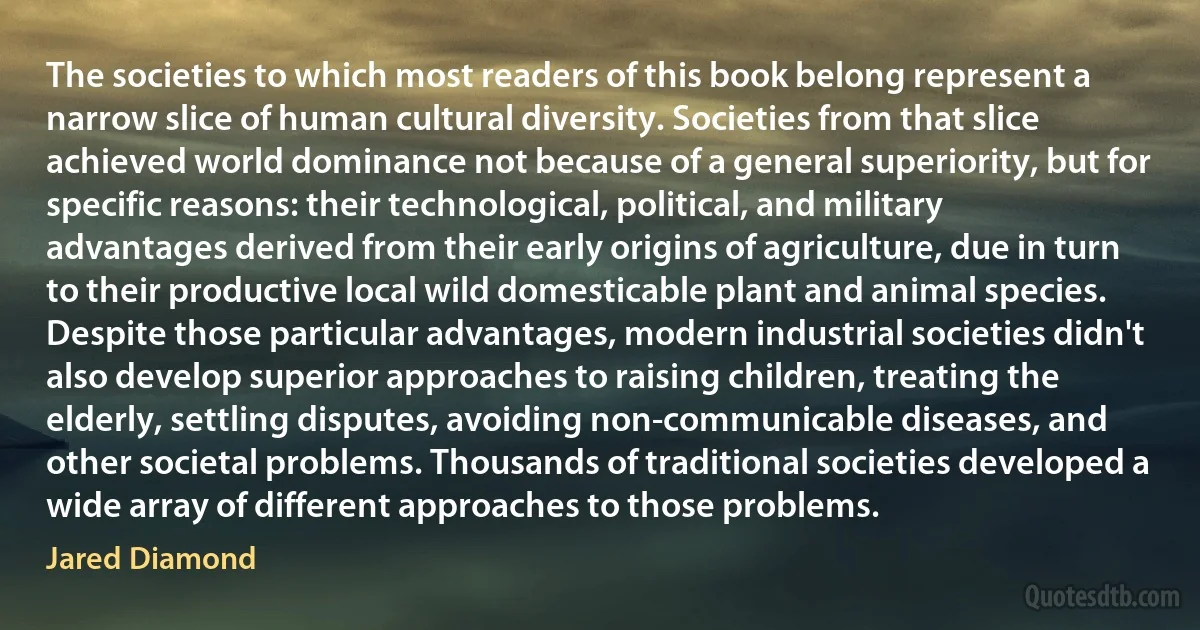
The societies to which most readers of this book belong represent a narrow slice of human cultural diversity. Societies from that slice achieved world dominance not because of a general superiority, but for specific reasons: their technological, political, and military advantages derived from their early origins of agriculture, due in turn to their productive local wild domesticable plant and animal species. Despite those particular advantages, modern industrial societies didn't also develop superior approaches to raising children, treating the elderly, settling disputes, avoiding non-communicable diseases, and other societal problems. Thousands of traditional societies developed a wide array of different approaches to those problems.
Jared DiamondRelated topics
animal array book children different dominance due early elderly general human industrial narrow plant settling specific superior traditional treating turn wide wild worldRelated quotes
A certain type of outdoor activity has been much developed in recent years and calls great throngs together, which may properly be designated as exhibition games. Under this head comes first in importance baseball, which is often known as the national game. Football and polo come in the same class. These activities require such long and intensive training that participation in them is necessarily confined to a class and can not be said to be open to the general public. But for creating an interest which extends to every age and every class, for giving an opportunity for a few hours in the open air which will provide a change of scene, a new trend of thought, and the arousing of new enthusiasm for the great multitude of our people, these have no superior.

Calvin Coolidge
I well remember receiving from one of the most earnest of my seniors the friendly warning that it was waste of time to study variation, for "Darwin had swept the field." Parenthetically we may notice that though scientific opinion in general became rapidly converted to the doctrine of pure selection, there was one remarkable exception. Systematists for the most part kept aloof. Everyone was convinced that natural selection operating in a continuously varying population was a sufficient account of the origin of species except the one class of scientific workers whose labours familiarised them with the phenomenon of specific difference. From that time the systematists became, as they still in great measure remain, a class apart.

William Bateson
Throughout their early stages the movements of civilization-for, properly speaking, there was no one movement-were very slow, were local in space, and were partial in the sense that each developed along but few lines. Of the numberless years that covered these early stages we have no record. They were the years that saw such extraordinary discoveries and inventions as fire, and the wheel, and the bow, and the domestication of animals. So local were these inventions that at the present day there yet linger savage tribes, still fixed in the half-bestial life of an infinitely remote past, who know none of them except fire-and the discovery and use of fire may have marked, not the beginning of civilization, but the beginning of the savagery which separated man from brute.

Theodore Roosevelt
The information about an Azeri military airplane entering the territory of the Armenian air border does not correspond with reality. The Armenian anti air defense system would not allow any country to enter the border line of the RA without permission. Armenia has one of the most modern technologies when it comes to the air military aspect in the region, and Azeri airplanes became more active in recent days due to general military exercises carried out by the Azeri side. They do not violate our border but are conducting maneuvers. Azerbaijan is aware that Armenia possesses the best anti-aircraft system in the region. No one can violate our border. Our military will perfectly perform the task they are charged with.

Mikael Harutyunyan
If it could be shown that the great Trust magnate or the great Aristocratic landowner, apart from the advantages of his inherited wealth, was a more highly developed species of humanity than the poor struggling sempstress or the unemployed docker, then there might be some justification for allowing the docker and the sempstress as the representatives of a weaker class to die out in order to enable the more highly developed creature to survive; but one moment's reflection will show that the alleged superiority of the landowner or the Trust magnate rests on one fact alone, namely, that he owns certain material possessions, usually inherited, which enable him to dictate the terms upon which his less fortunate fellow creatures shall be permitted to live.

Keir Hardie
